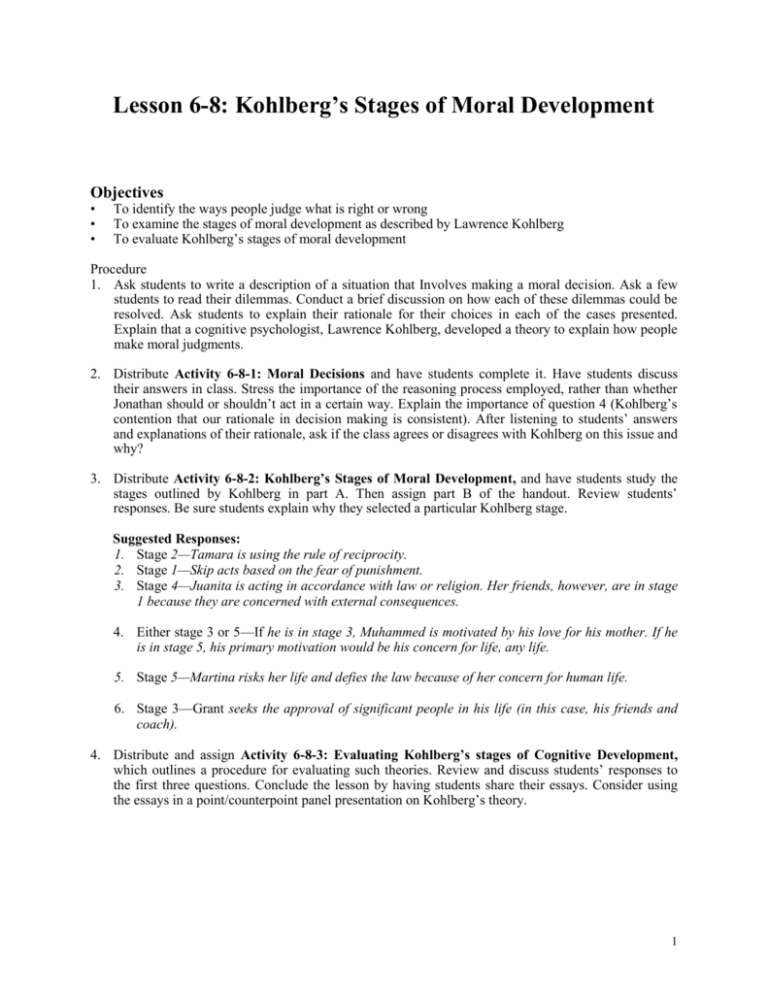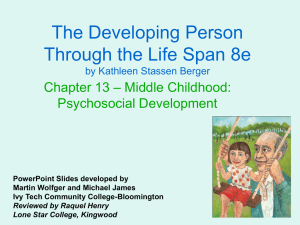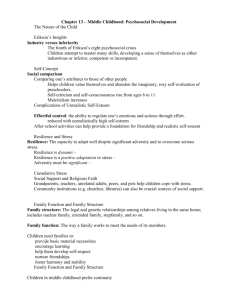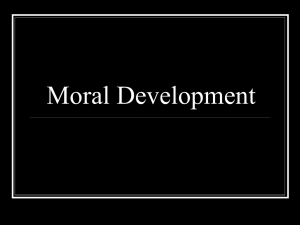Lesson Plan 8-7
advertisement

Lesson 6-8: Kohlberg’s Stages of Moral Development Objectives • • • To identify the ways people judge what is right or wrong To examine the stages of moral development as described by Lawrence Kohlberg To evaluate Kohlberg’s stages of moral development Procedure 1. Ask students to write a description of a situation that Involves making a moral decision. Ask a few students to read their dilemmas. Conduct a brief discussion on how each of these dilemmas could be resolved. Ask students to explain their rationale for their choices in each of the cases presented. Explain that a cognitive psychologist, Lawrence Kohlberg, developed a theory to explain how people make moral judgments. 2. Distribute Activity 6-8-1: Moral Decisions and have students complete it. Have students discuss their answers in class. Stress the importance of the reasoning process employed, rather than whether Jonathan should or shouldn’t act in a certain way. Explain the importance of question 4 (Kohlberg’s contention that our rationale in decision making is consistent). After listening to students’ answers and explanations of their rationale, ask if the class agrees or disagrees with Kohlberg on this issue and why? 3. Distribute Activity 6-8-2: Kohlberg’s Stages of Moral Development, and have students study the stages outlined by Kohlberg in part A. Then assign part B of the handout. Review students’ responses. Be sure students explain why they selected a particular Kohlberg stage. Suggested Responses: 1. Stage 2—Tamara is using the rule of reciprocity. 2. Stage 1—Skip acts based on the fear of punishment. 3. Stage 4—Juanita is acting in accordance with law or religion. Her friends, however, are in stage 1 because they are concerned with external consequences. 4. Either stage 3 or 5—If he is in stage 3, Muhammed is motivated by his love for his mother. If he is in stage 5, his primary motivation would be his concern for life, any life. 5. Stage 5—Martina risks her life and defies the law because of her concern for human life. 6. Stage 3—Grant seeks the approval of significant people in his life (in this case, his friends and coach). 4. Distribute and assign Activity 6-8-3: Evaluating Kohlberg’s stages of Cognitive Development, which outlines a procedure for evaluating such theories. Review and discuss students’ responses to the first three questions. Conclude the lesson by having students share their essays. Consider using the essays in a point/counterpoint panel presentation on Kohlberg’s theory. 1 Suggested Responses: 1. a. Kohl berg’s theory formulates a complete and plausible procedure for studying moral development. b. The theory allows moral development to parallel cognitive development. c. It allows either a positive or negative decision in a moral dilemma to exist because the stages are based on motivation, not action. Extension 2. Working in a self-selected small group, write a fifteen-minute skit that Illustrates Kohlberg’s stages of moral development. Present the skit to the class. 2. a. Kohl berg believes that people are consistent in making moral judgments despite the situation. b. The theory may be male-oriented in its hierarchy of stages. c. The theory may be too cognitive in its approach and not take into account emotional decisions. 3. religious text; conscience; what feels right; absence of moral decision making; etc. 2 Name____________ Date________________ Personal Dilemmas Read the situations described below, and answer the questions that follow. Be prepared to share and explain your rationale for responses. Jonathan is a junior in high school and has many decisions to make in his life. He wants to go to college very much but is unable to pay for it. He has missed the deadline for qualifying for financial aid. He feels he will excel at any college he attends, but he needs an academic scholarship. Although his grade point average is good, it is not high enough to earn him the desired scholarship. Knowing this, he thinks about boosting his scores by cheating on his mid-term exams. Jonathan has other decisions to make. His girlfriend is very possessive, and he would like to date others without upsetting her. Mindy, his girlfriend, attends a different high school. There is a big dance coming up at his school, and he is thinking of asking a girl from his psychology class. He is afraid that Mindy will find out and get angry. Jonathan has other problems to face. While Jonathan was on a school field trip, Tim, his best friend, asked if he could use his locker. Jonathan didn’t quite see the necessity of this but told Tim it was okay. A few days later, the school searched the student lockers looking for illegal drugs. Jonathan’s locker was identified as one of those possessing drugs. He was called to the principal’s office and asked to explain. He was told that the police had been called. 1. Should Jonathan cheat? Why or why not? 2. Should Jonathan ask his classmate to go to the dance with him? Why or why not? 3. Should Jonathan implicate his best friend? Why or why not? 4. Review your answers for each situation presented. Is your rationale for the solution to Jonathan’s problems the same in each case? If there are differences in your reasoning, explain why you used a different rationale for each situation. 3 Kohlberg’s Stages of Moral Development (pages 246-247 of Psych textbook) Part A: Read in your textbook and fill in the blanks over the stages of moral development as described by Lawrence Kohlberg. You may write on this sheet. Stage 1: ___________________ Moral Reasoning Goal: _______________________________ Moral decisions are based on the consequences of the action. “Will I be punished?” Stage 2:____________________ Moral Reasoning Goal: _______________________________ Moral decisions are decided on the benefits derived from the action (satisfying needs). “Will I get what I want?” In this stage, decisions are also made on the principle of reciprocity. One might ask, “Does the victim deserve it?” or “what do I get in exchange?” What does “reciprocity” mean (in your own words)? _________________________________________ Stage 3:_____________________ Moral Reasoning Goal: _______________________________ Moral decisions are determined by evaluating the action in terms of love and approval of family and friends. “Will my family or friends get mad at me?” Stage 4:_____________________ Moral Reasoning Goal: _______________________________ Moral decisions are based on the law and/or religious beliefs. “Is it right according to the law?” Stage 5:___________________ Moral Reasoning Goal: _______________________________ Moral decisions are based on fairness, justice, and truth. Oftentimes, civil law is superseded by a higher moral law as determined by one’s personal conscience. “Is there a higher good that can come from the action I do?” Stage 6:______________________ Moral Reasoning Goal: _______________________________ Morality of individual conscience, not necessarily in agreement with others. The people that typically have reached this level of reasoning are _____________________. What is one reason you can think of that boys tend to score at higher levels of Moral Reasoning than girls? 4 Quiz Questions Directions: For each situation, decide in which stage of Kohlberg’s theory the person is responding. Write your answer and why you use this rationale for choosing a particular stage. 1. Tamara has five tests in one day. She is a good student but did not have time to study for her French test. She knows the person who sits next to her In French class is also a good student. This girl has copied from Tamara on occasion. Tamara decides to look at the other girl’s test for the questions she doesn’t know. Besides, thinks Tamara, “I never should have five tests in one day anyway.” 2. Scott thought about leaving school early and going to a baseball game. He stayed in school because he was afraid of getting caught. 3. Juanita’s friends were at the mall, and someone suggested they do a little shoplifting just to see if they could get away with It. Juanita wouldn’t participate and said stealing is wrong. 4. Muhammad lives with his mother in a poor section of the city. His mother is quite ill and needs outpatient services daily at a hospital some miles away from their home. Muhammad steals a car to take his mother to the hospital. 5. Martina, a young woman living in a war-torn region of the world, distributes food to orphans living in the streets. This activity is actually against the law. She frequently has to deceive the authorities in order to keep these children alive. 6. Grant wants to spend time after school volunteering at the hospital. However, he is a good basketball player, and practice interferes with this volunteer program. The coach and other teammates pressure him to play. Grant decides to play with the team. 5








